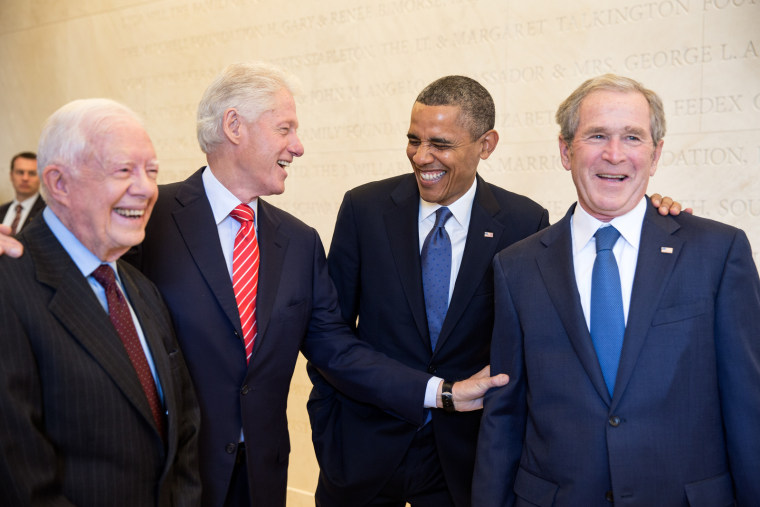For Republicans, there is no bigger issue on the political landscape than President Obama taking executive actions on immigration. This one issue has driven GOP officials to raise the prospect of a government shutdown, presidential impeachment, and the defeat of every major legislative initiative of the next Congress.
We
talked a bit about this on Friday, but
a national report from the Associated Press has elevated this angle considerably.
President Barack Obama's anticipated order that would shield millions of immigrants now living illegally in the U.S. from deportation is not without precedent. Two of the last three Republican presidents -- Ronald Reagan and George H.W. Bush -- did the same thing in extending amnesty to family members who were not covered by the last major overhaul of immigration law in 1986.
There was no political explosion then comparable to the one Republicans are threatening now.
Over the last several days, GOP officials have sought to draw a distinction between
limited, targeted executive actions, intended to advance the nation's humanitarian and foreign policy goals, and the more sweeping policy Obama reportedly has in mind. And on this, the right has a compelling case to make -- or at least half of a compelling case.
The Clinton administration, for example, adopted a deferred-action policy towards a modest number of Salvadoran immigrants as a result of their country's civil war. The H.W. Bush administration took similar steps to protect Chinese students fearing persecution in 1990. The W. Bush administration issued an executive order expediting the naturalization process for green-card holders who enlisted in the United States military.
It's not unreasonable to argue these measures are qualitatively -- and quantitatively, for that matter -- different from the kind of actions the Obama White House reportedly has in mind. Those recent examples set a precedent, but their scope and scale is dissimilar.
That's only part of a larger story, however.
More from the AP report:
Nearly three decades ago, there was barely a peep when Reagan and Bush used their authority to extend amnesty to the spouses and minor children of immigrants covered by the 1986 law. In 1986, Congress and Reagan enacted a sweeping overhaul that gave legal status to up to 3 million immigrants without authorization to be in the country, if they had come to the U.S. before 1982. Spouses and children who could not meet that test did not qualify, which incited protests that the new law was breaking up families.
Congress considered expanding the law, but the effort ended up failing, prompting Reagan to act on his own. The Republican administration said it had "
discretion" in how best to enforce federal law in this area, and in this case, Reagan used that executive power to derail deportations -- if immigrant parents were given amnesty as part of the 1986 law, their kids could stay, too.
The problem persisted, though -- the AP report noted that "spouses and children of couples in which one parent qualified for amnesty but the other did not remained subject to deportation." So, in 1989, H.W. Bush took executive actions of his own to help keep families together.
Congress, rather than throwing a tantrum and impeaching the president, codified Bush's policy into law soon after.
And while the narrow, limited orders related to Nicaraguan and Chinese immigrants are different from what Obama intends to do, these other measures from Reagan and Bush are actually quite similar.
Mark Noferi of the pro-immigration American Immigration Council, told the AP, "It's a striking parallel. Bush Sr. went big at the time. He protected about 40 percent of the unauthorized population. Back then that was up to 1.5 million. Today that would be about 5 million."
Congress hadn't acted, a president saw a problem he could fix, so the executive branch relied on prosecutorial discretion to address a pressing issue, shielding a very large group of immigrants from deportation. We can debate whether the policies have merit, but to call the actions "unprecedented" simply isn't correct.
What's more,
National Journal reports that these kinds actions go back even further.
The president's announcement that he would soon take executive action to "to do what he could" to fix a broken immigration system in the absence of legislation has prompted critics to assert that this would be unprecedented unless first authorized by Congress. In fact, the record demonstrates the opposite. For at least the last 70 years, presidents have routinely acted first to permit the entry of people outside normal channels or to protect large numbers of people from deportation, with legislation ratifying the executive action coming later. During World War II, the Roosevelt administration negotiated a temporary worker arrangement with the Mexican government, later known as the Bracero program, an action Congress ratified a year later. When the authorization expired in 1947, the Truman administration continued the program until it was reauthorized in 1951. Before it ended in 1964, millions of workers entered the United States under the auspices of the Bracero program, hundreds of thousands under executive -- not legislative -- authority. The program was rightly criticized for numerous labor and human-rights violations, but few questioned the executive authority it operated under.
It's possible that today's congressional Republicans have no idea that this history exists. It's also possible they just don't give a darn.
But for those who take the debate seriously, these precedents matter. The fact that Obama appears likely to follow a trail that's already been blazed flips the burden back to freaked-out lawmakers -- if previous Congresses didn't descend into madness as a result of executive actions on immigration, why should this Congress behave differently?
